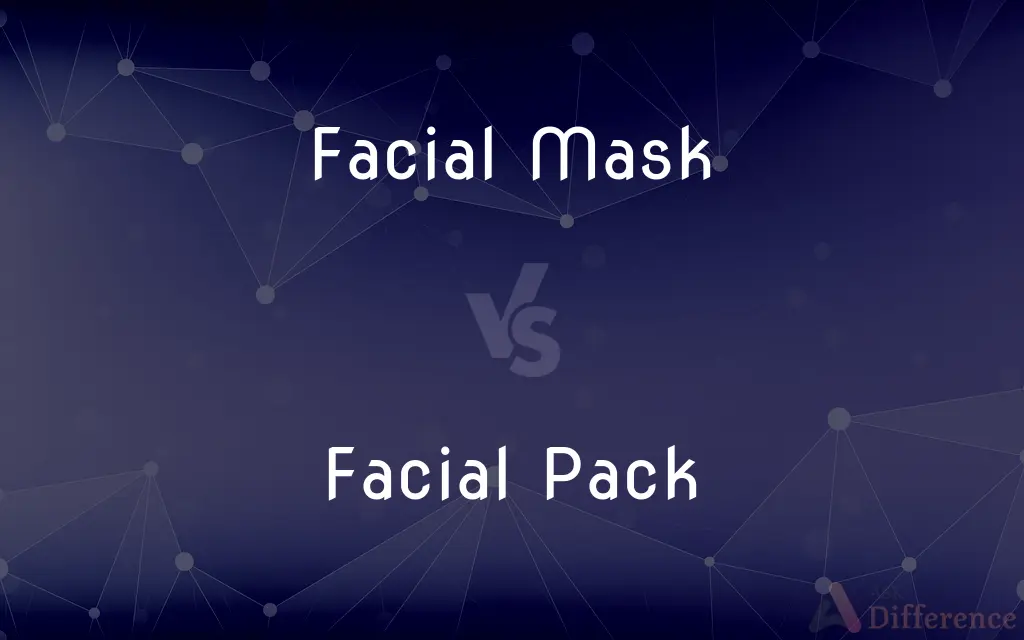Facial Mask vs. Facial Pack — What's the Difference?
By Tayyaba Rehman & Urooj Arif — Published on February 3, 2024
A facial mask is a skin treatment product applied and left on the skin for a short period, typically targeting specific skin issues, while a facial pack is a thicker, paste-like blend used for deep cleansing or nourishing the skin.

Difference Between Facial Mask and Facial Pack
Table of Contents
ADVERTISEMENT
Key Differences
Facial masks are formulated with a variety of ingredients tailored for specific skin concerns, and they come in different forms like cream, gel, or sheet masks. Facial packs, however, are generally thicker in consistency, often made from natural ingredients, and are applied as a thick layer onto the skin for deep nourishment or detoxification.
Facial masks are applied to clean skin, left on for a brief period, and are typically used for hydrating, brightening, or calming the skin. Facial packs are used not just for surface-level treatment but also for deep cleansing, drawing out impurities from the pores, and are usually kept on the skin for a longer duration until they dry out.
Facial masks are designed to address specific skin issues like dryness, acne, or aging, and are often part of a regular skincare routine. Facial packs, on the other hand, are used less frequently, primarily for intensive skin treatment, focusing on deep cleansing, tightening pores, or restoring skin balance.
Facial masks are usually easier to remove, often simply washed off or peeled away, leaving the skin refreshed and treated. Facial packs might require more effort to remove due to their thicker consistency, and they often leave the skin feeling deeply cleansed and rejuvenated.
Facial masks can be used more frequently, even daily for some types, offering a quick and targeted treatment. Facial packs are typically used once or twice a week, providing a more intense, longer-lasting treatment to the skin.
ADVERTISEMENT
Comparison Chart
Composition
Lighter, varied forms (cream, gel, sheet)
Thicker, paste-like consistency
Usage
Short-term application, specific concerns
Longer duration, deep cleansing/nourishing
Benefits
Hydration, brightening, soothing
Detoxification, pore tightening
Application Frequency
Can be used more frequently
Used less frequently, intensive treatment
Removal and Aftercare
Easy to remove, instant refreshment
May require effort to remove, deep cleanse
Compare with Definitions
Facial Mask
Facial masks come in various forms and textures, catering to different skin types.
For her sensitive skin, she chose a gentle gel-based facial mask.
Facial Pack
Facial packs are formulated to draw out impurities and tighten pores.
His weekly routine includes a facial pack to minimize pore appearance.
Facial Mask
A facial mask is a skincare treatment applied to address specific skin concerns.
She used a hydrating facial mask to combat her dry skin.
Facial Pack
Facial packs are used less frequently, focusing on long-term skin benefits.
He uses a facial pack bi-weekly for maintaining his skin’s health.
Facial Mask
Facial masks are a convenient way to deliver concentrated nutrients to the skin.
He used a vitamin C facial mask to brighten his complexion.
Facial Pack
A facial pack is a thicker, intensive skin treatment for deep cleansing and nourishment.
She applied a clay-based facial pack to detoxify her skin.
Facial Mask
Facial masks offer quick and visible results, perfect for immediate skin refreshment.
Before the party, she used a radiance-boosting facial mask for an instant glow.
Facial Pack
Facial packs provide a deeper treatment, revitalizing the skin over time.
To restore her skin's balance, she uses a soothing facial pack.
Facial Mask
Facial masks are part of regular skincare routines for targeted treatment.
She applies a purifying facial mask weekly to keep her acne at bay.
Facial Pack
Facial packs often use natural ingredients for holistic skin health.
She prefers a homemade facial pack with turmeric for its antiseptic properties.
Common Curiosities
Can I use a facial pack daily?
Facial packs are usually used less frequently than masks, typically once a week, as they are more intensive treatments.
Are facial masks suitable for all skin types?
Yes, but choose a mask formulated for your specific skin type (dry, oily, combination, sensitive, etc.).
What is a facial pack?
A facial pack, often similar to a mask, is a treatment product applied to the face, generally thicker in consistency and used for specific skin benefits like deep cleansing or nourishment.
How often should I use a facial mask?
It depends on your skin type and the mask's purpose, but generally once or twice a week is recommended.
What is a facial mask?
A facial mask is a skincare product applied to the face, typically used to cleanse, hydrate, or treat the skin.
What are the main differences between a facial mask and a facial pack?
The main differences are in consistency, with packs being thicker, and in function, with packs often providing more intensive treatment.
Can facial masks cure acne?
Masks can help manage acne by cleansing and soothing the skin but are not a standalone cure.
Should I wash my face after using a facial pack?
Yes, it's usually recommended to rinse off a facial pack with lukewarm water after the advised duration.
Are facial packs good for anti-aging?
Certain facial packs are designed with anti-aging ingredients and can help reduce the appearance of aging.
Can I make a facial mask at home?
Yes, homemade masks using natural ingredients like honey, yogurt, or avocado are popular.
Is a facial pack the same as a face mask sheet?
No, a facial pack is generally a cream or gel, while a face mask sheet is a fabric soaked in skincare ingredients.
How long should I leave a facial mask on?
Typically, 10-20 minutes, but always follow the product's instructions.
Can I use a facial mask if I have sensitive skin?
Yes, but choose masks specifically formulated for sensitive skin to avoid irritation.
Is it normal for a facial pack to cause tingling?
Mild tingling can be normal, but if it's uncomfortable or burning, wash it off immediately and avoid that product in the future.
Do facial masks need to be refrigerated?
Some natural or preservative-free masks may require refrigeration, but most commercial masks do not.
Share Your Discovery

Previous Comparison
Flea Market vs. Farmer’s Market
Next Comparison
B.M.S. vs. B.B.A.Author Spotlight
Written by
Tayyaba RehmanTayyaba Rehman is a distinguished writer, currently serving as a primary contributor to askdifference.com. As a researcher in semantics and etymology, Tayyaba's passion for the complexity of languages and their distinctions has found a perfect home on the platform. Tayyaba delves into the intricacies of language, distinguishing between commonly confused words and phrases, thereby providing clarity for readers worldwide.
Co-written by
Urooj ArifUrooj is a skilled content writer at Ask Difference, known for her exceptional ability to simplify complex topics into engaging and informative content. With a passion for research and a flair for clear, concise writing, she consistently delivers articles that resonate with our diverse audience.














































